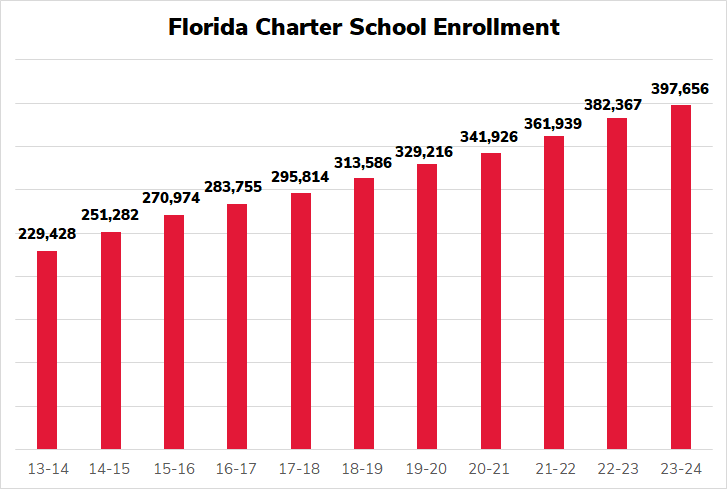
Florida’s charter schools grew by more than 15,000 students this school year.
And new research suggests their steady growth might help students in district schools.
In recent years, charter schools in our state have scored under-the-radar policy wins, clearing away barriers to their growth and inching closer to funding parity with district schools.
They’ve also grown steadily, by about 5% a year, more or less, for the past decade.
New data from the Florida Department of Education show they now serve just shy of 400,000 students, making them the state’s most widely used educational choice option.
And there’s evidence that the growth of charter schools, like the growth of private school scholarship programs, may be spurring improvements in school districts.
Last month, a team of researchers published a new working paper with the National Bureau of Economic Research. Their paper finds that even one new charter school opening can drive “modest but economically meaningful” increases in reading scores at district schools within a five-mile radius, as well as improvements in student attendance.
New charter schools appeared to have no measurable impact on math achievement. Perhaps of note: Other research has shown Florida’s charter schools outperform district schools in reading on average, while performing roughly the same in math.
Similar studies in other states have also found benefits from charter school competition. A study in North Carolina found benefits in math, but not in reading, while a study in Massachusetts more closely resembled the Florida results, finding benefits in reading.
The authors of the Florida study have also examined the competitive benefits of our state’s private school scholarship programs.
In the new working paper, they look at how competition from charter and private schools combine.
They note that a larger private school presence appears to boost charter school’s positive effects on district reading scores, but private school competition appears to dampen charters’ positive effects on attendance.
The results also shifted when the researchers used different measurement techniques, so they warn against drawing strong conclusions about whether private school competition can amp up the competitive benefits of charter schools.
“One hypothesis that we can reject, however, across multiple approaches is that more private school competition in places with elevated public school competition meaningfully harms students’ outcomes. We view this as an important findings from education policy perspective,” the researchers write.
In other words, this study adds to a body of research showing that while increased competition doesn’t always spur public schools to improve, it rarely makes them worse.
A rising tide of expanding school options can sometimes lift all boats. And at the very least, it’s unlikely to sink any of them.


